Interview with Gitouf Elnema, MD
A Conversation with Gitouf Elnema, Assistant Clinical Professor
Salam Alekoum, Gitouf. Yours is not a common Arabic name, is it? What is its meaning?
The spelling here is different than the pronunciation we use back home, which is "Qu-toof," is mentioned in Holy Quran and means variety of fruits as we hope to find in Paradise. My father came up with the name as he did for my older sister, whose name is Hatoon, a name that means, heavy rains, or heavy tears. My father's name, Elnema, means grace. I always thought I have a unique name.
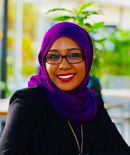
Where were you born and raised? Tell me about your family, your parents and siblings.
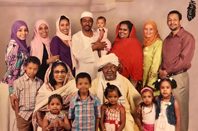
I was born and raised in Khartoum, the capital of Sudan. My mom was raised in Khartoum, in an upper middle-class family. My father was born in El-Gazira, a state south to Khartoum and had moved to the capital to study engineering at the University of Khartoum. He is still a professor in Civil Engineering there and is very much an academic. My mom studied Economy and Political Science and earned her PhD in Sociology, and she worked in many national and international organizations including UNICEF. I have two sisters, one of whom is a pediatrician and the other studied psychology, and two brothers who are both, like our dad, civil engineers. Our parents supported and blessed everything that we wished to pursue. I have to mention my maternal grandmother who essentially raised us because my parents were so busy studying and working; she was a lovely strong lady and I have such happy memories of her.
What was life growing up in Khartoum? Who was the strength behind keeping your family together?
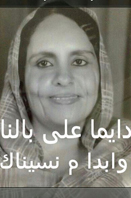
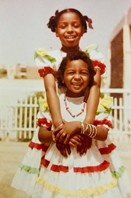
Khartoum is a very interesting and diverse city. People from other states move there in hopes of finding better job and living opportunities. Diversity enriched the city and people brought their own stories and experiences with them, so a multicultural, welcoming, and vivid city is what I mostly remember. I have to say, Sudanese people are probably some of the most welcoming, friendly people you would meet and they carry that proudly with them wherever they go. I also remember going with my siblings to music concerts and memorizing most of my favorite songs at a very young age. My birthday, ironically, is the same day that the current dictatorship regime took power in a military coup, so every year, when parades and celebrations were televised, I thought that they were all for me!
I would say my mom is our family rock, she got her strength from my grandma, who was strict but kind and always wanted the best for all of us. My mom always wanted us to try everything we can in life and to enjoy it. She often took us on her travels for work, so we were lucky to visit many countries in Africa, Europe, and Asia, and we were exposed to so many different cultures. She taught us to be curious, communicative, and interactive with the world and other people. And to never let anything stop us from reaching our goals. My father is more on the traditional and conservative side, but we always looked up to him as an example of a dedicated, professional, and respectful man. They are very different but they just let each other be, and they managed to give us a wonderful life that we are thankful for.
How did you and your husband meet? What is your story?
We met in medical school and he was four years ahead of me. He was active in politics and leadership positions so I was impressed with his personality. He first saw me in a meeting and later told me he knew he will marry me one day. We were born on the same day five years apart, and I thought he was lying until I saw his ID. Soon after we got engaged, he decided to come to the United States for residency, and we had to have a traditional Islamic ceremony before he left. Because of a visa issue, he couldn't return to Sudan for our formal wedding party, so I was by myself. I wore two wedding dresses, a white dress and a traditional red dress/thobe. I had the henna and Jertik ceremonies, both are mix of religious and cultural beliefs to bless the marriage. When he was able to travel, my new husband and I met in Egypt where we had our official wedding pictures taken. I eventually joined him in Atlanta, Georgia in 2011. I was pregnant with my first daughter by the time I started my USMLE exams and took all of them until two weeks before my delivery. To this day, I feel proud that I was able to push myself through that particular time. But I wouldn't have done that without my husband's support.
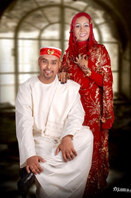
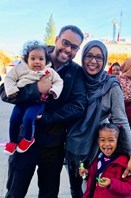
"An-Nasr Lana." "Victory is Ours." Do you foresee a time when the national Sudanese motto might become a reality? What would that look like?
I do. The ongoing revolution against the regime has brought hope for the people of Sudan. The country was split into north and south, and there was disruption and inequity everywhere. People are fed up with this regime, its corruption, the economic decline, and lack of opportunities. People are sick of rising costs of essential food items, lines for gas and ATM machines, and they are not seeing any clear vision or plan to resolve any issues. Peaceful protesters are killed simply because they asked for their rights. The international community shows no interest in helping with the situation in Sudan other than condemning it, and the people are left to fight for the fall of this regime by themselves. I feel the victory is already achieved, by Sudanese people coming together, breaking their fear chains, fighting for their rights, and standing against the injustice after long time of keeping silence.
Describe thobe and what hijab means to you.
Thobe is our traditional and national female costume. It can be worn by all females, but it mostly signifies married women especially if one has henna on her hands and feet. It wraps the body like an Indian sari, but we use the long end of it as a scarf to drape over the head. I personally love it and it gives me a wonderful feeling as I honor the traditions of my country but I also feel very feminine in it. Here, I only dress in thobe when we go to a gathering within the Sudanese community. I wore hijab at a young age and as I became older, it reflected my religion, my culture, and my identity as a Sudanese Muslim woman. It is a choice that I made and it makes me feel empowered, strong, and complete. Hijab reflects who I am and I wear it proudly.
You have a radiant smile. What elicits joy?
Life in general, although of course it isn't always joyful. But I would say I try to stay positive most of the time. Also, my family makes me happy, in particular my daughters. Just seeing how they interact with each other brings joy to my life, and they both have wonderful smiles too. Overall, I am more of an extrovert person, and I get my energy from people around me and for that I love sharing life experiences with others and it is just wonderful to be able to do that.
What is your Northern Sudanese favorite dish to cook?
We have a meat stew that is similar to a pasta sauce but thicker with ground meat, diced tomatoes, and weika, powdered okra, that gives a unique flavor and texture, like gumbo file. It is easy to make and we eat it with a type of porridge or flatbread. Molokhia, Egyptian spinach, is another one of my favorite dishes. Sudanese food is not bland; it has both basic and complex flavors, and we often make multiple dishes out of one basic combination of ingredients. I'm not crazy about the kitchen, but when I cook, I think I am an excellent cook.
Would you sing or say something of a beloved song? What is its loose translation?
One of the popular revolution songs has been stuck in my head for a couple of months now. It is a remix of an old song with chants from current revolution played in contemporary music. Translation: On the wings of dawn fluttering over are your flags, and from beneath your sleeves the sun will rise, oh my people, your revolution is your flame and you shall reach your goal and all you aim for.
Shukran, Gitouf.
- by Oralia Schatzman
View Gitouf's professional bio | Go back to interviews
